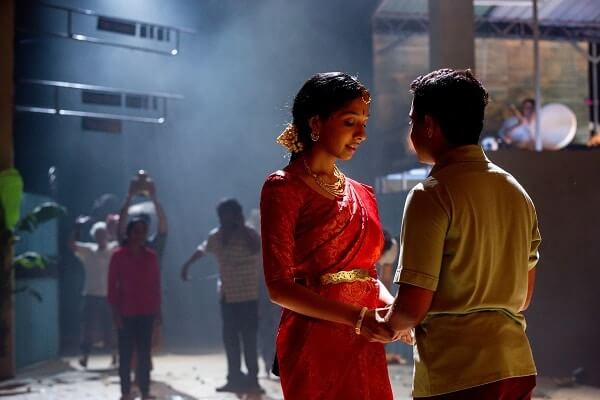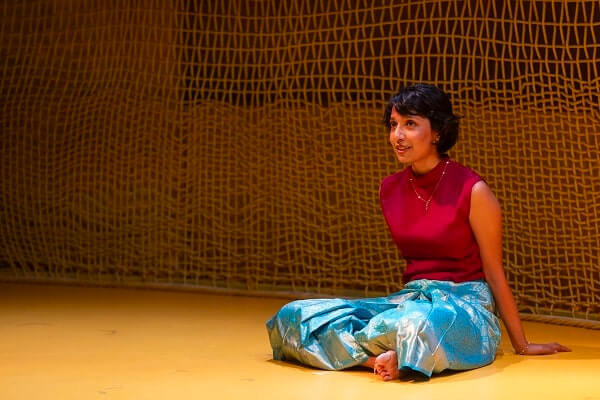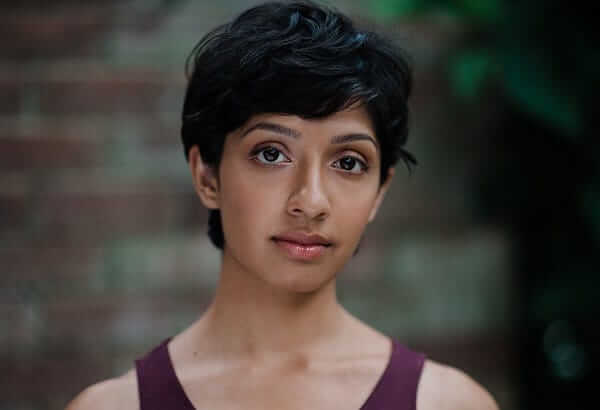VAISHNAVI SURYAPRAKASH is a Sydney-based actor, dramaturge, dancer and performance maker. She is currently starring in Belvoir St Theatre’s performance of Nayika: A Dancing Girl, and won a Helpmann Award for her performance in S.Shakthidharan’s Counting and Cracking.
Lakshmi Ganapathy: You trained at drama school but also grew up learning Bharatanatyam – what’s it like for your practice being literate in both western and Indian artistic traditions?
Vaishnavi Suryaprakash: I feel privileged to inhabit this space where I can straddle multiple worlds…Being able to have a different perspective on a methodology or a technique really helped me in drama school, where the focus mostly was on Westernized learning. There’s nothing wrong with that, I think it’s useful to have that knowledge, but it also meant I didn’t just take everything on as gospel and there were different ways I could access, craft, or present performance because of my classical Indian training as well, and vice versa.
Coming to this play and dancing again…there are things about the way that I dance now that are different to how I did before. Bharatanatyam is a neoclassical dance form, it’s got roots in culture and mythology, but at the end of the day, it’s a continued reinvention. I feel free to bring myself and what I like aesthetically to the way I dance now without feeling like ‘this is the way to do it’.
Lakshmi Ganapathy: You’ve been in everything from new works like Counting and Cracking, to classics like Brecht’s Galileo; what draws you to working on a script?
Vaishnavi Suryaprakash: I work a lot on instinct. I feel like if you listen to something bigger, it kind of guides you, so my first response reading a script is usually the thing; there’s something about the character that really excites me, or it speaks to themes I haven’t seen before or opens the conversation in a different way.

I’ve found I’m [drawn to] things which have some kind of conversation starter or social message; I’m realising now that’s really important to me. Even with comedy, a bit of social satire, the ones that have a bit more to say rather than just the pure farce of it, I think.
People are also important because you’re spending so much time with them creating together and being vulnerable. I’ve been so lucky to work on things with amazing people.
Lakshmi: Nayika follows a heroine confronting her past and coming into herself – is there a moment in your life you’ve felt a similar feeling of reclamation?
Vaishnavi: What I really like about her looking back is the way she ends up using her body and her mind to reclaim dance as a means of resistance, rather than something that fits into a box. On a very tangential level to that, I guess [this echoes] my experience coming back to dance after all these years; the way I viewed dance when I was younger is not the same way I view it now, I feel like I can honour it without being subject to every single part of it that maybe I don’t like. I’ve come to a different relationship with the dance form through this piece.

Lakshmi: What’s something that you’re currently listening to/reading/playing/watching?
Vaishnavi: I just started reading The Rain Heron by Robbie Arnott. It’s my second time reading it, it’s one of my favourite books of all time. He writes in this beautiful, poetic, lyrical way about nature and human relationships.
Lakshmi: What’s a word that you like in a South Asian language, and what does it mean?
Vaishnavi: I’m going to be super vanilla and choose ‘Chai’ because I’m obsessed with tea; over COVID, I started to realise my dreams of being an amateur tea connoisseur! My mother-in-law makes the best chai in the world, she just makes this huge vat every morning and doesn’t even drink from a cup, she drinks from one of those Corelle bowls! Whenever I drink chai, I always think of her now, it’s so good and it’s just full of all her love.
Lakshmi: And finally, Soan Papdi or Papdi Chaat?
Vaishnavi: Soan Papdi, 100%. I’m the biggest sweet tooth. We used to get those like Haldiram packets when I was young and I was like, what is this thing that looks like hay but melts in your mouth!
READ ALSO: Why we need a new kind of Nayika (heroine)





